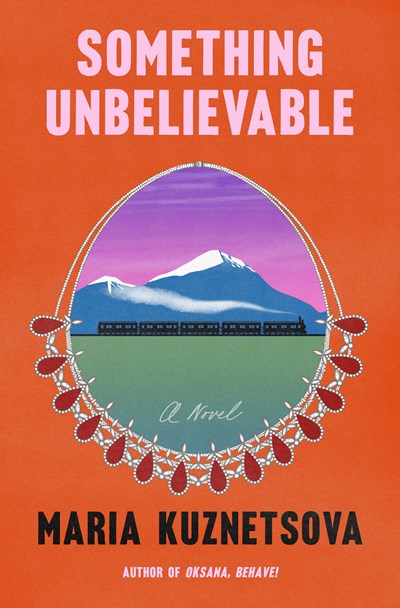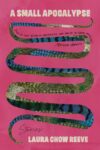 Maria Kuznetsova’s novel Something Unbelievable is a standout second book, a step into murky thematic waters and with the full embrace of her trademark humor and heart that we saw in her first book, Oksana, Behave!. Natasha, a struggling actress and overwhelmed young mother, asks her grandmother, stubborn and sharp Larissa, to tell the story of her three-year escape from the Nazis. Natasha’s cynicism meets Larissa’s tough honesty in a wonderfully true relationship complicated by fate, inheritance, love, lust, and art.
Maria Kuznetsova’s novel Something Unbelievable is a standout second book, a step into murky thematic waters and with the full embrace of her trademark humor and heart that we saw in her first book, Oksana, Behave!. Natasha, a struggling actress and overwhelmed young mother, asks her grandmother, stubborn and sharp Larissa, to tell the story of her three-year escape from the Nazis. Natasha’s cynicism meets Larissa’s tough honesty in a wonderfully true relationship complicated by fate, inheritance, love, lust, and art.
We talked over Zoom about writing history that’s not historical fiction, babies as anti-romcom, and the joy of not knowing where a character ends up.
Megan Cummins: Literature is so important to the characters in the book, especially Larissa and her friend, later husband, Misha, who read together during the war. How did you choose the books they read together?
Maria Kuznetsova: Literature is obviously the thing that matters to me the most outside my family and friends, and yet when I write about it, I feel like it’s so boring — or so hard to communicate my love for it. Originally, I had many scenes of Larissa and her future husband, Misha, bonding over books, but eventually I cut out any of those scenes that did not deepen their connection and were just an excuse for me to point out passages I loved from The Brothers Karamazov without any real connection to my book. I tried to keep enough of their love for books in there so that it would feel pretty devastating when Misha stops reading with Larissa after they get married and she sees he was just doing it as a courtship thing. While that didn’t necessarily excuse her wandering eye later on, I think it set it up well.
What about the historical research for the book?
I read the The 900 Days: The Siege of Leningrad by Harrison E. Salisbury, which included a big prologue to what the climate was like before the war, what people thought and what they expected, as well as Last Witnesses: An Oral History of the Children of World War II by Svetlana Alexievich. Those books were in the background, as well as Vasily Grossman’s big doorstopper of a novel Life and Fate. But I definitely used my imagination a lot. My grandmother told me some real stories that did happen in the war, but I wanted to have creative license and have fun with it. I read more to fact check than to get information, to make sure that what the people were eating or reading or wearing or even talking about wasn’t completely off. I don’t think of it as purely historical fiction, but more of a meditation on how family stories shape the people who are left to imagine them.
You’re right, it’s not just historical fiction, it’s storytelling and memory too, a little magical the way all memory is. You mentioned children of the war — I thought Polina, Larissa’a younger sister, was such a surprising character. Except for the characters who die in the war, she’s the most changed by it. I was wondering if when you started writing her if you know that would be her trajectory?
I knew that she would end up with Bogdan, Misha’s brother, but I didn’t really know how or why, so I worked backwards and asked, Why would this girl who was lighthearted and flirtatious leave Ukraine and do charitable work and give up all material interests? When the war starts, she’s a year younger than her sister, and was used to their hoity-toity grandmother’s previously lavish lifestyle, where they danced around in boas and ate French foods. She’s already beautiful and is used to getting lots of attention from boys and men. During the war, she was weaker than Larissa, got more sick from starvation, and lost her looks. Some truth about the world’s superficial nature was revealed to her in a way that it was not to Larissa, who wasn’t good looking to begin with. Later on, Larissa becomes the flirtatious one who marries into wealth and becomes the person she used to criticize. She moved into an apartment like the one her grandmother had, which she had previously scorned.
Larissa, too, was changed by the experience of the war, but she’s so stoic that it was almost hard to see the changes register in her.
The fun of Larissa’s character was that she’s your point-of-view character in the beginning, so she’s telling us as though she’s the person who is right, and then she begins to wonder who was right in this story after all. That was the fun of having a lot of minor characters for her to brush up against. My teacher Ethan Canin warned against a “narcissistic central intelligence” and that’s when your character tells you the world is a certain way and then sets out to prove it with every interaction with other characters. The challenge and fun of this book, which is different from Oksana, is that there are so many characters so there’s a ping-pong effect, and I don’t even always know who’s right. There were many times when it felt like Polina saw the world for how it truly was, instead of Larissa.
There are a couple points in the book where Larissa is about to do something but stops short. She’s about to comfort her sister, or she’s about to grab her grandmother’s hand before she jumps in front of the train but she doesn’t. Because she felt like whatever was going to happen was going to happen. And it made me think of the way fate is working in the book. Larissa feels like a fatalist to me, and I was wondering if you think she is. She comes to believe her dad was destined to die because he’d learned to be so selfless in the orphanage.
It’s tricky because when you’re writing a book you want things to feel fated, so you set things up like that. Her dad is selfless because his mother sent him to an orphanage, and this trait led to his downfall. That’s a plot point, right? As a writer, you have to have some belief that point A connects to point B in some way, unless you just believe in the absurdity of everything, which also works. Maybe it’s a Soviet thing — when you don’t have an organized religion, the culture is just more fatalistic in that way, but that could just be my experience. It’s a way to have some kind of meaning without having a god.
That’s so interesting. How in your mind does Natasha think differently about the world than Larissa does, or do they think about it in the same way?
Natasha spent a lot of time with her grandma, going to the sea in the summers, and saw her grandma having affairs and having this wild heart, and I think Natasha does think of fate a lot. Like her grandmother, she also doesn’t have a religion. When she starts dating Yuri, there’s very much the idea that “my dad died so I married Yuri. There he was at the funeral at the right time, and now I’m here with a kid not knowing what I’m doing.” There’s a sense of this led to this led to this. But then at the end of the book she asks her grandpa for advice and the advice is go look at the sunset. Is there something to learn, or is it just us trying to make sense of a bunch of things that happened? This book was plotted really carefully, with four sections of alternating points of view, so, in a way, the structure of the book made the events feel more fated. In my debut, Oksana, Behave! I focused on the random absurdity of her life, of the fact that she lived in a different place in every chapter and that everything felt confusing, disorienting, and lacking structure, so that book’s episodic nature was more reflective of that lack of a traditional logical progression or fate, if such a thing exists. So the structure of each of my books also reflects the way that their characters view the events in their lives, and some of the larger ideas in each book.
Something that stuck with me early on was the idea of family names. Natasha changes her name to Sterling for her career, and Larissa changes her name to Orlov, giving up her own family name. For the characters in the book, what do their names mean to them? I thought there was something symbolic going on — or maybe not. What’s in a name?
My grandmother actually didn’t give up her own last name, which in the Soviet Union was pretty rare, but she was kind of a badass. Larissa was deeply ambivalent about taking on the Orlov name because of the Orlov Institute being the most prominent scientific institute in Ukraine and what his family represented for the Soviet Union, in terms of their achievements with welding related to bridges and later on, tanks in the war. Larissa’s name was a connection to her parents whom she loved. Natasha was an Orlov, too, so she got this stage name so she would sound so American, but she only goes for these Russian parts anyway. Though like Larissa, she also felt removed from the Orlov name. Her dad passed away and she and her mom had a tough relationship. She wanted a rebirth too. But then again, she named her daughter after her grandma she never met, which is taboo. You’re supposed to ask. Natalia is a real Russian name, but Talia is an Americanization of it, but it’s a slight homage to her grandma.
In Russian, everyone has a patronymic, which is kind of a middle name based on the name of your father that people use along with your first name. My dad’s name is Alexei, so people would call me Maria Alexeevna, kind of like, Maria of Alex. This is one of the many ways that makes the culture so patriarchal. It’s kind of like how the structure of my novel reflected its ideas about fate — the way people address each other reflects their attitudes about how women always “belong” to men.
I want to talk about Stas, whom Natasha develops feelings for, and Yuri. I feel like this book and your writing are just so beautifully anti romcom. Stas becomes more and more irresistible to Natasha. He spends all this time with her, helps her with her baby, does things Yuri is too busy to do, then they have this really passionate kiss, and then he presents her with this terrible poem, a mash-up of all the Russian greats her grandmother read. I feel like a lot of writers might end with a romantic let down like this, but you take it next step and complicate it because actually he still is compelling to her. He still has that electricity even though he’s been taken down a few notches. Her feelings can’t be erased by a bad poem, and there’s no way to easily resolve it, or resolve it at all. But I was wondering how you planned out that trajectory of their relationship? What were you thinking about Stas and Natasha?
I had versions where Natasha and Stas had a full-on affair and had some awkward sex scenes, but that didn’t really feel right. And then they were going to run away together, but that didn’t feel right, either. Then she completely shut him down after the poem, and that didn’t feel right, so I left the door open at the end. The logical thing is that she goes back to her husband because it’s absurd, right, to be with a guy ten years her junior when they have a newborn, but I wanted to write it from a place of not actually knowing what she’s going to do. I actually don’t know even now, which made it more fun to write, knowing the place where I’d end up was a place of not knowing. The baby makes it impossible to have a romcom. That’s what a newborn does.
It’s babies that are anti romcom.
Babies are definitely enemies of romcom!
I love that. Because that relationship between Talia and Natasha, that’s the one relationship that is not in flux. Her grandmother too, but she’s probably never going to see her grandma again.
The romcom, in a way, is with her own daughter. That’s the one actual true love story in the book, at least for Natasha. The idea that she will always love her daughter is more important than anything else she’d figure out.
Natasha, struggling with her auditions, decides to write a one-woman play telling the story of her grandma., I love seeing Larissa’s reaction — she’s proud but a little bit offended. I love that your book is full of characters, so many characters, and it ends with a one-woman play. So perfect and hilarious. What was it like to write the play?
In the end, I wanted the play to be about Natasha discovering what she wanted the play to be. It’s a story about Natasha connecting to her grandma and her daughter, creating these connections between these women of different generations. The men are kind of superfluous. They have to be around, but in the end it’s about what the women were able to make of each other. Without romance, things are felt more deeply, seen more clearly. The play crystalizes that. One of the last times Natasha talks to Larissa, she has her makeup on and gray powder in her hair. Larissa finds it disturbing, but one day Natasha will be that old woman, passing down her own story to her daughter. So in a way, writing about that play helped me figure out the themes in my own book — that there was a present-day love triangle with Natasha and Stas and Yuri, and a past love triangle with Larissa and Bogdan and Misha, but really, it’s about these women figuring out their own relationships and what they mean to each other. Natasha deepens her connection to her grandmother and her daughter, while her grandmother forgives herself for how she might have influenced Natasha when she was younger, and also for how things ended with her sister.
One thing we haven’t talked about was the heirloom necklace, passed down from generations, which Larissa steals from her grandmother. Could you talk about the necklace? Does the meaning of it change over generations?
It’s a traditional symbol of inheritance, and is of course on the cover of my book, and its jewels separate each section of the book, too. It manifests some of the ideas in the book. For Larissa’s grandmother, it belonged to her own mother. It was an empress’s necklace and it symbolized wealth and her family’s power. And then it was something she lost, both the power and the necklace, which—spoiler alert—Larissa steals. It shows how far Tonya fell. When Larissa gives it to Natasha, it cements this family connection, but it’s not like she really knows what to do with it. The story throws up its hands at that. Her financial situation could be better, but it’s not so dire that she needs to sell it, or use it to run away with Stas. When Larissa holds the necklace up in front of the baby, she’s saying, it’s your burden now. The necklace is going to be as different for her as it was for Larissa, as it was for her great-grandmother. It also represents ambivalence and the changing meaning of family connection. It’s this unusable gift. Natasha isn’t going to do anything with it. At best, she’s going to pass it on to her daughter, one day. That felt right to me. That the necklace didn’t represent wealth, but the fact that it would continue to be passed down and to take on new meaning.
What are you working on now?
I’m working on a sequel to Oksana, Behave!
Amazing! I can’t wait to be back in league with Oksana.
Something Unbelievable
by Maria Kuznetsova
Random House
April 2021
Megan Cummin‘s book, If the Body Allows It, was longlisted for the Story Prize and the PEN/Bingham Award for Debut Story Collection. She lives in Brooklyn, where she is the managing editor of A Public Space.
This post may contain affiliate links.








